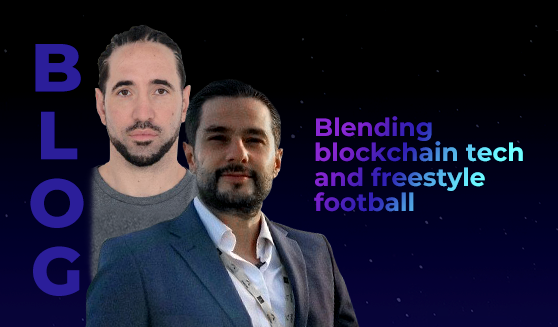
Why sustainability is the heart of the smart city revolution
The smart cities of the future will use tech to lower emissions, cut urban temperatures, and improve quality of life in highly populated areas.


Sean Garnier (Founder of Urbanball) started his professional football career at Auxerre, in France. An injury forced early retirement – but “I was fortunate to have a talent for freestyling,” Garnier told us, “so I chose to forge my own path in this sport.”
Freestyle football is a sport of tricks: juggling the ball using any part of the body (but not the hands, forearms or elbows). It combines principles of dance and acrobatics with football skills and music, making it entertaining for an audience and a ripe ground for competition with freestyle opponents.
Over 15 years, Garnier has established a successful career in freestyling. And in 2004 he founded Urbanball: “with the aim of promoting street football and freestyle.”
Urbanball is a comprehensive ecosystem that includes a blockchain-based game through which players can collect NFT character cards to compete – facilitated by Urbanball’s 2021 partnership with digital collectibles platform EX-Sports, led by Toli Makris.
Garnier and Makris both joined us at #LEAP23. So we caught up with them to get the lowdown on Urbanball and its innovative blend of sport and tech for you, LEAP blog readers.
“In 2021, I joined forces with EX-Sports to bring our shared vision of creating a comprehensive street football ecosystem to life. Together, we introduced Urbanball Fight (UBF), a new football sport, and developed a platform that offers resources, support, and exposure to talented young footballers. The platform integrates technology throughout, from the app to talent management and the use of NFTs and gaming.
“For instance, we scout talent through actual Urbanball Fight matches, create digital collectible NFTs of the winners, who also become playable characters in the world’s first street football web3 mobile game where players can earn royalties.”
“Using sports as an example, there are countless athletes in niche disciplines such as freestyle and street football who work just as hard and are equally dedicated to excellence. Despite their efforts, they often lack the same opportunities as those in mainstream sports, including infrastructure, guidance, and sponsorship. Technology offers a transformative opportunity for niche sport athletes, levelling the playing field and providing new possibilities for those who need it most. That’s why I partnered with EX-Sports, as they prioritise promoting and supporting niche sports like mine.”
“Our ultimate objective is to establish Urbanball as a sports federation and collaborate with millions of talented individuals worldwide to grow their careers in street football. Our vision is to eventually have UBF (Urbanball Fight) recognized at the Olympic Games. However, staying grounded, we have exciting plans for the next 12 months. We will host UBF qualifiers in Africa and Asia, culminating in the World Finals. Additionally, we will release more digital collectibles and launch the full Urbanball play-and-earn game.”
“For the past 20 years, I have been active in the sports industry as both a fight promoter and technology provider for sports federations. My role as a fight promoter required me to manage every aspect of an event or tournament, including infrastructure, matchmaking, ticketing, TV distribution, streaming, and more. I spent 15 years promoting Muay Thai in Thailand and then globally, and I am proud to have helped it become recognised by the Olympics.
“This experience exposed me to the technology challenges and disparities faced by niche sports like Muay Thai, inspiring me to create EX-Sports. Over the last 6 years, I have been working with various sports federations as their technology partner. I learned about Urbanball through Sean Garnier in 2021 and, after understanding his vision for the company and street football, I invested in a partnership as I was inspired to support and be a part of it.”
“Correct implementation can be game-changing, both literally and figuratively. Play-and-earn games should have a real-world purpose that benefits people, opening up wider business opportunities beyond just publishing a game. Our Urbanball project is a great example of this. Urbanball fans can compete in real UBF tournaments and, if they win, have their NFT collectible created and become an in-game character, earning royalties. For those who want to play the game for fun and rewards, they can also lend their NFTs to others and share earnings. All earnings are in the game’s native token, which can be used to purchase products and services from the EX-Sports marketplace, such as sports experiences and equipment.
“This approach not only grows our business but stays true to our goal of supporting niche sports and athletes. The same approach can be applied to other games and industries. This can bring a positive impact to different areas and provide a unique and meaningful experience for all.”
Thanks to Sean Garnier and Toli Makris at Urbanball and EX-Sports. Discover LEAP to learn more.

The smart cities of the future will use tech to lower emissions, cut urban temperatures, and improve quality of life in highly populated areas.

Discover the cities that rank highly for smart city preparedness, and learn why locally relevant innovation is more important than cutting-edge tech.

If you’ve ever thought about becoming a tech investor, read this – learn why investors are the quiet force shaping the future of the industry.

The smart cities of the future will use tech to lower emissions, cut urban temperatures, and improve quality of life in highly populated areas.

Discover the cities that rank highly for smart city preparedness, and learn why locally relevant innovation is more important than cutting-edge tech.

If you’ve ever thought about becoming a tech investor, read this – learn why investors are the quiet force shaping the future of the industry.